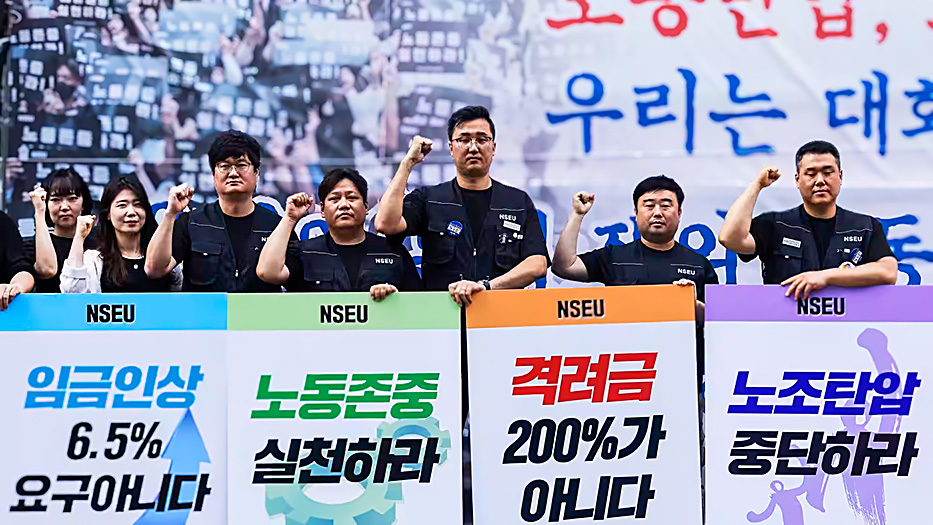
The National Samsung Electronics Union (NSEU) announced on Monday that it will launch a general strike against Samsung that will continue until the company meets its demands for better pay and more time off, according to a report by Reuters. The union went on to warn “of [a] more damaging action” against the company than a one-day walkout last month.
See more about a nasty labor situation building at Samsung
Let me start this report by attempting to convey how the news of union unrest in Asia is quite unusual. Like most countries around the world, Asian countries also have labor unions, but traditionally the relationship between a labor union and a company stays controlled and peaceful. It’s hard to explain it, but for example, there could be strong disagreements and disputes that elsewhere in the world would flare up into aggressive labor actions. However, in Asia, such disputes were typically handled in a more gentlemanly manner with resolution through negotiations.
So it caught my attention when this story first crossed my screen in mid-June. At that time, the story was that the NSEU workers’ union had staged a one-day walkout against Samsung – itself a big story in Asia. The work stoppage lasted an entire day – but it was deliberately staged by the union on the day after a public holiday, which was a time of lower production, as it takes a few days to wind back up to full production.
A Signal ‘Of More Aggressiveness Among Employees’
Even though the union deliberately sought to pick a time of minimal impact on the company – the very act of calling for a walkout against one of the largest companies in South Korea was, frankly, shocking. And the union meant the action to be a visible signal of “more assertiveness among employees,” – in other words, a warning to Samsung. The hope had been that the company would get serious about the union demands, which, up until then, it had only partly addressed.
“The purpose of today’s strike action is to have meaningful conversation with management,” Lee Hyun-kuk, an NSEU official told Reuters. He noted that the union was preparing “further action” if necessary. The union did not say how many workers participated in the walkout.
Union Calls for Workers to Strike, Starting July 8th
When that walkout didn’t seem to work – Samsung management basically shrugged it off and told the media there was no impact on production – the union felt it was forced to follow through on its promise of “more action” if needed, and called for a major general strike against the company. This general strike is scheduled to run from July 8th through July 10th.
Ratcheting up the pressure by ratcheting up the impact, this morning, the union called for a three-day work stoppage. It will be interesting to see how the company reports that impact.
“We have sincerely engaged with the union and will continue talks with them,” a company official told Reuters.
Will Automated Production Mute the Impact of a Strike?
One unofficial source told Reuters that the impact on chip making is minimal, because the process is automated. But a company spokesperson told the news agency that the machines running the process have highly trained operators to shepherd the process. If operators walk off the job for any protracted period of time, it will impact production.
This escalation by the union is an effort to show the solidarity of its members and to push Samsung into resolving the matter at the negotiating table before more permanent strike lines are drawn with greater damage to the company.
Five Major Unions at Samsung
There are five major unions at Samsung, of which the NSEU, with 28,000 members, is the largest, representing about 20% of the company’s total employment. These five unions often coordinate their activities for the greater benefit of all employees.
The company had already offered employees a 5.1% increase in wages, but the union was looking for further improvements and transparency to a performance-based bonus system and an extra day of annual leave for all workers. The company was not responding to those other requests, causing the union to step up its tactics.
We are declaring a general strike today. Until our demands are met, we will fight with the ‘no pay no work’ general strike.”
Son Woo-mok, NSEU President
Strike Comes at a Challenging Time for Samsung
When reached by Reuters seeking a response to the union’s call for a longer strike, Samsung declined to comment.
To make matters even more interesting, this strike comes at a challenging time for Samsung. After an incredible multi-decade run, the good ship Samsung is hitting really rough waters now. As the world technology industry shifts to AI, Samsung’s chip division has fallen behind others producing more sophisticated chips. In fact, it has fallen so far behind that the head of that division was recently dismissed as the company says there is a “crisis.”
Although it is one of the world’s largest suppliers of memory chips, Samsung is actually well behind other manufacturers of high bandwidth memory (HBM) chips which are needed for AI applications. SK Hynix and Micron are already supplying massive amounts of HBM chips to Nvidia, the number one global player in the global graphic processing unit market for AI applications. Nvidia holds about 80% of the AI market.
Samsung Trying to Catch Up With Other Suppliers of HBM Chips
Samsung is working hard to catch up, but there’s more work to do. Recently, Reuters reported that Samsung’s HBM chips have yet to pass Nvidia’s tests to qualify for utilization in its products. SK Hynix remains Nvidia’s primary supplier of HBM chips. Industry analysts point to Samsung’s failure in the Nvidia testing “as a crucial milestone both reputationally and in terms of profit momentum,” according to Reuters.
A long, drawn-out union shutdown could push the company further and further behind its competitors.
See more on Samsung by visiting samsung.com/us/.





Leave a Reply